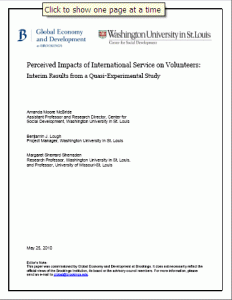BSI, the national standards body for the UK, drafted BS8848 in 2007 to provide specifications for the provision of visits, fieldwork, expeditions and adventure travel overseas. It was later revised slightly in January 2009. As an American staff member at Projects Abroad, which is headquartered in the UK, I feel uniquely placed to comment on this standard in the context of the American field of international volunteer service.
What is a British Standard?
A British Standard is not, by itself, a law. It is, essentially, just a book that outlines the way that, at least in the BSI’s opinion, a service or product should be provided. Standards can be written about pretty much anything – electrical wiring, plumbing, food service, etc. For example, their website announces a recent release of a standard for “Control layout for construction cranes.”
Adherence to a British Standard is voluntary and self-assessed. No one forces organizations to adhere to a Standard, and no government body checks to make sure that those who claim to adhere actually do. In other words, anyone can self-certify to a standard by simply announcing it.
British Standards are useful because they make contracts easier. If, for example, your plumber says he adheres to Standard X – and he installs a toilet without following those rules – it’s very easy to show that he didn’t meet his contractual obligations. In a typical scenario, a supplier announces that she is Standard X certified because she knows that customers will only select suppliers that certify to Standard X.
How does BS8848 compare to the IVPA’s Principles and Practices?
As one would expect, there are many similarities between BS8884 and IVPA’s Principles and Practices. Both outline pre-trip material requirements, safety and security procedures and accommodation standards.
However, there is one area where BS8848 differs greatly from IVPA principles: in the area of staffing and supervision. On the one hand, IVPA principles offer a general requirement of organizations to have staff in-country to take care of volunteers as a primary area of responsibility, and a requirement that these staff must be on call in the event of an emergency.
B.S. 8848 has much more specific demands for the proximity and participation of staff in activities. It has a very long list of requirements for the “Venture Leader” – the term for the staff member in charge. In fact, the Venture Leader is required to be on hand at essentially all times.
Some IVPA organizations may meet these requirements, but many high quality programs (full disclosure: this includes my own – Projects Abroad), would have no choice under this standard but to designate the participant herself as the “Venture Leader.” This is simply because volunteers have an immersion experience on our projects; breaking away from a group of other travelers is an essential part of the program.
I believe that this aspect of the standard is not fair or useful for these Volunteer Sending Organizations (VSOs.) The criterion implies that the support offered by these VSOs is somehow insufficient. The reality is that many volunteer programs are designed to incorporate more independence and cross-cultural exchange than a group trip or expedition. Such a structure does not automatically lead to the conclusion that the volunteer is “leading” her own project, or that it is the volunteer’s responsibility to make sure that her program runs smoothly.
This difference between BS8848 and IVPA principles is the direct result of focus. BS8848 was not developed with Volunteer Sending Organizations (VSOs) in mind specifically, as IVPA principle were. BS 8848 was developed with expeditions and school trips as their primary area of focus, and for these types of projects it is sensible to require more interaction between staff and participant. Both standards have room to grow, but this difference in focus shows that there will always be a need for both.
Tom Pastorius
Vice President
Projects Abroad








Recent Comments